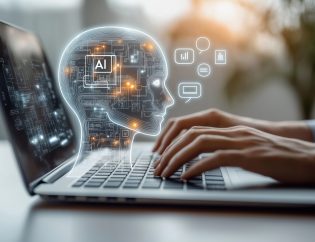The use of Artificial Intelligence (AI) in hiring and recruiting is rapidly rising, with new technology quickly transforming how recruiters evaluate candidates and make decisions.
According to a study by Facts and Factors, the global market size for AI recruitment was valued at 610.3 million USD in 2021. The market is expected to grow to USD 890.51 million by 2028. While this emerging technology offers an opportunity for faster and more efficient resume screening processes, it also raises questions about privacy issues, algorithmic bias, and other ethical considerations concerning fairness in decision-making.
In this blog post, we will be exploring these topics further as well as ways employers can maximize their success by using AI tools responsibly.
The Current State of AI in Recruitment
The world of recruitment has undergone a significant transformation in recent years, thanks to advancements in artificial intelligence (AI). From sourcing candidates to conducting interviews, AI-driven technology has played a crucial role in streamlining the hiring landscape and enhancing overall efficiency.
Market statistics reveal that the use of AI in recruitment is on the rise and is expected to continue growing in the coming years. However, as with any new technology, AI-driven recruitment practices come with their own set of challenges and potential pitfalls. One major concern is the potential for bias in AI decision-making. Nonetheless, AI can help recruiters overcome bias and enhance candidate experiences by providing personalized and data-driven insights.
While there are many potential advantages of AI in recruitment, it remains to be seen how well these technologies will be adopted and integrated into the industry in the long run.
Potential Bias in AI Algorithms
As AI algorithms become more ubiquitous, concerns have been raised regarding potential biases in these systems. The sources of biases in data used to train AI algorithms are complex and often difficult to identify.
One such source of bias is historical data that has incorrect or incomplete information. The manner in which data is collected and the variety of data collected can also introduce biases into the system. For example, if a recruitment algorithm is trained on job applications that are predominantly from male candidates, it will be less likely to identify and select female candidates for positions.
In addition to historical data, AI algorithms can also be biased by their design. For example, if a machine learning algorithm is given an objective such as “predict the likelihood of successful hiring” without any further context, it can result in a model that is biased towards certain characteristics or criteria.
AI algorithms have the potential to reduce the amount of bias in recruitment decisions. However, this requires careful consideration when designing and training these systems. Employers must be aware of their responsibility to ensure that any AI-driven decision-making processes are fair and unbiased.
Understanding and addressing these sources of bias is necessary to ensure that AI algorithms are fair, inclusive, and effective.
Artificial Intelligence's Impact on Diversity and Inclusivity
Recruiting AI has the potential to revolutionize the hiring process. With the use of algorithms, it can quickly sift through a large pool of applicants and identify the most suitable candidates for a given role. However, as with any new technology, there are concerns about potential biases and the impact on diversity and inclusivity.
AI can negatively impact diversity and inclusion in the recruiting process by:
- Introducing algorithmic biases that lead to a disproportionate number of certain types of candidates being selected for positions.
- Automating decisions without taking into account the nuances of individual applicants or their qualifications.
- Focusing on one narrow set of criteria, such as experience or education, without considering other important factors such as problem-solving skills and soft skills.
The good news is that there are methods to mitigate these biases, such as ensuring that diverse data sets are used to train the algorithms. Additionally, companies are recognizing the benefits of embracing neurodiversity and racial diversity in the workplace, which can enhance innovation and productivity.
By taking a thoughtful approach to implementing recruiting AI, companies can foster a more inclusive workplace for the future.
AI Privacy and Security Concerns
As technology continues to advance, privacy and security concerns are at the forefront of everyone's minds. This is especially true for companies handling sensitive candidate information.
It's vital that companies follow legal regulations to ensure compliance and avoid any legal repercussions. Best practices for data protection include:
- Encrypting data.
- Implementing two-factor authentication.
- Regularly conducting internal security audits.
- Establishing an incident management plan for handling any breaches.
It's important to remember that data breaches can result in serious consequences, including damage to a company's reputation and loss of trust from customers. Companies must prioritize data protection to safeguard their clients and maintain their reputations. By taking these precautions, companies can ensure that candidate information will remain secure and private.
Transparency and Explainability
In today's world, transparency is a hot-button issue in decision-making. With the rise of artificial intelligence (AI) and its increasing integration into our daily lives, the need for transparency is more pressing than ever.
AI algorithms often make complex decisions that are difficult to explain, leaving many people wondering how they arrived at a certain conclusion. However, ensuring AI decision-making is transparent and explainable is not without its challenges. It requires collaboration between data scientists, developers, and stakeholders to ensure that the decision-making process is clearly communicated.
Strategies such as creating public-facing transparency reports and involving diverse groups in the development process are just a few ways that companies can work towards improving transparency and accountability.
Ultimately, being transparent about the decision-making process is necessary to build trust and integrity in AI-powered systems.
AI's Impact on the Empathy and Human Touch
In an age where technology is advancing at an unprecedented pace, there is the potential for human touch to be lost in the recruitment process. With the increasing use of AI-based solutions, it is easy to see how this could happen. However, the importance of human interaction and empathy cannot be overlooked.
While technology can aid in the selection process, it is ultimately a real person involved who makes the final decision. This is where the balance between technology and the human connection becomes crucial. As a recruiter, you must prioritize building relationships with candidates, which can lead to better candidate experience and better outcomes for both parties.
When leveraging AI in the recruitment process, it is important to remember that technology should enhance rather than replace the human connection. The best solution is a combination of technology and humans working together to ensure a successful hiring outcome.
By keeping this balance in mind and incorporating both factors into the recruitment process, we can ensure that we do not lose sight of the value of the human element.
Best Practices for Ethical AI Recruitment
The development and implementation of ethical AI recruitment practices are becoming increasingly important in today's rapidly evolving technological landscape. To ensure fairness and avoid bias, it is crucial to:
- Collaborate with diverse teams during the recruitment process.
- Implement continuous monitoring and assessments of these practices to maintain ethical standards.
- Educate both the hiring managers and candidates about the ethical design and implementation of AI recruitment practices.
- Ensure that all candidates are given equal consideration and access to opportunities regardless of race, gender, or background.
- Establish procedures for transparency and accountability when using AI in the recruitment process.
AI technology in recruiting and hiring processes can bring tremendous value to organizations due to its ability to reduce time and effort, increase accuracy, uncover new candidate sources, find better matches for vacancies, and much more. However, these benefits are accompanied by a number of ethical considerations that must be addressed in order to achieve fair and responsible practices when adopting AI in recruitment.
It is important for HR professionals and organizations to familiarize themselves with the best practices for utilizing AI in recruitment. This includes implementing filters that align with job requirements and utilizing anonymization techniques. It is crucial to take an active role in ensuring ethical compliance when utilizing AI technologies for recruitment purposes.
As the world moves towards an increasingly digitized future, companies should be mindful of their responsibility to create safe practices around the adoption of AI recruiting technologies while maximizing potential benefits for candidates and employers alike.









